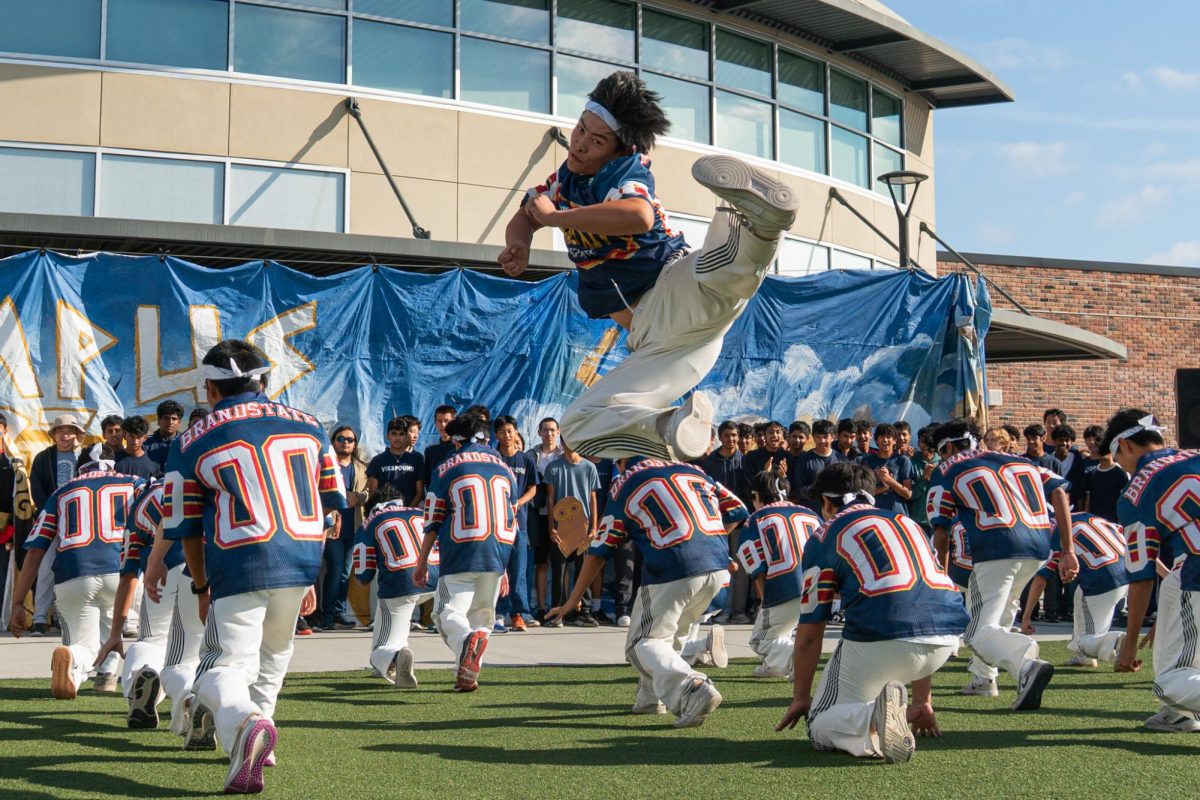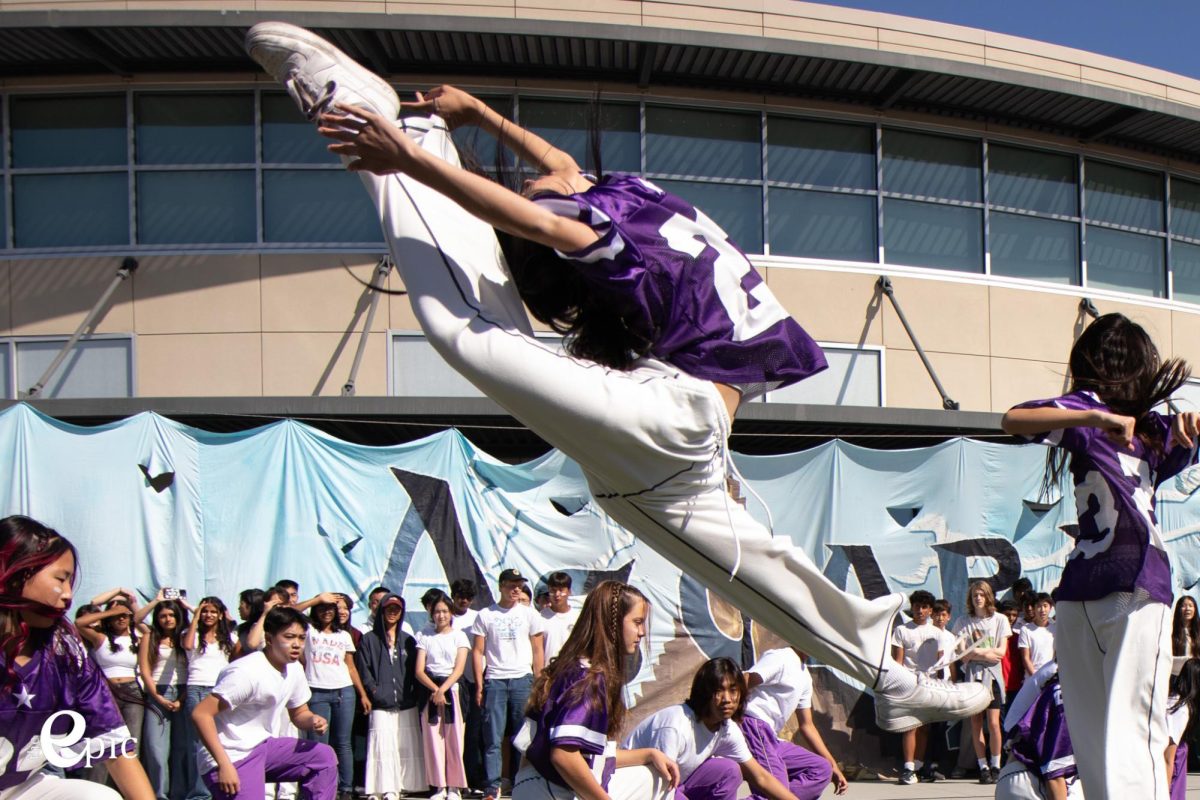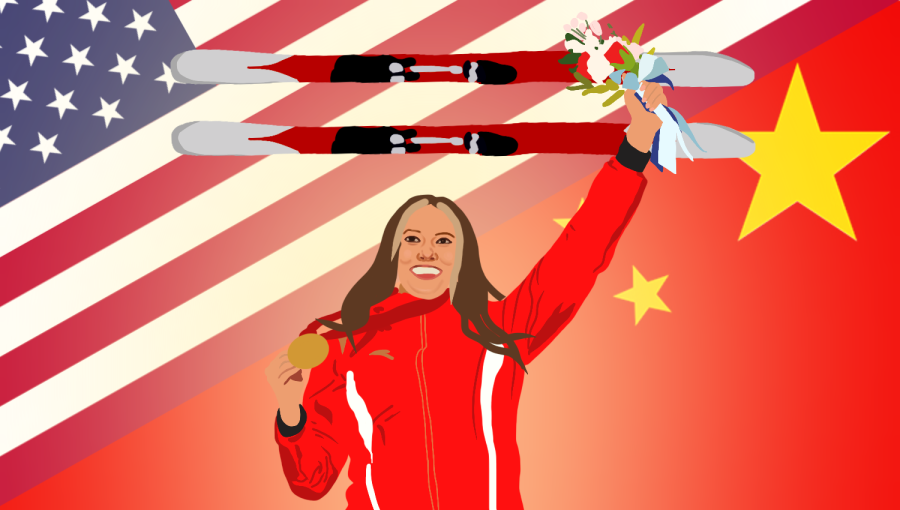Eileen Gu: Chinese-American skier, Olympic gold medalist, inspiration to multi-ethnic identity
Graphic illustration by Amy Liu
Chinese American skier Eileen Gu wins two gold and one silver medal for Team China in the 2022 Winter Olympics.
March 8, 2022
The Chinese audience roared as Eileen Gu, an American-born free-skier competing for China at the Winter Olympics, won gold for the Women’s Big Air Freestyle Skiing event after successfully landing a trick she had never previously attempted. Everything just seemed so easy for her — she defied gravity as she effortlessly jumped and flipped in mid-air. Gu went on to win a silver in Women’s Slopestyle and another gold in Women’s Halfpipe, becoming the first action-sport athlete to win three medals at the same Olympics.
Despite her massive achievements, I was angry — those could have been three medals won for the U.S., the country where she was born. Like many others on the internet, I saw her as a traitor to America.
A few days later, I was shocked to learn that Beverly Zhu, an American-born ice-skater who gave up her citizenship to compete for China, was criticized by both Americans and Chinese people on social media for falling during competition, both sides claiming she wasn’t truly part of them. If Gu hadn’t met the enormous expectations placed on her, she would have faced similar backlash from both countries. Why should both winning and losing be a negative scenario for athletes that don’t compete for their home country? The world is so focused on capitalizing on these athletes’ success if they are skilled enough to win, yet people don’t genuinely care for the athletes themselves.
Gu’s background paralleled my own, one that saw both China and America as my home countries. Gu was born in San Francisco and raised by her Chinese immigrant mother who attended graduate school in America, mirroring my own upbringing with Chinese immigrant parents. Gu and I both speak fluent Chinese and English. Similar to my dad driving me to Lake Tahoe every winter and teaching me to ski, Gu’s mother first introduced her to skiing and accompanied her on all of her day-long trips to practice her soaring jumps and flips, whether that be in the U.S. or China.
When she was 13 years old, Gu had to choose a team to compete for but was conflicted between her two nationalities, a decision much harder than any of the tricks she could do. My 8-year-old self faced this same conflict when I was asked by my parents if I was Chinese or American, believing the decision could only be one or the other. The truth is, Gu and I are both Chinese and American. Ethnic and national identity is a delicate yet inseparable nature of growing up as immigrants or children of immigrants. When someone is American, they don’t lose their cultural background and connections. Chinese Americans can still be patriotically American while supporting China.
At the age of 15, Gu made the momentous decision to compete for Team China in the 2022 Winter Olympics, shocking the American world of skiing. With skiing in the background of Chinese athletic circles, she believed that she, a medal-contender, could spur an interest in the sport she loves, inspiring young girls in the world’s most populated country to pick up skiing. Unlike in the U.S., winter sports in China are nascent, with China only winning 62 medals prior to the 2022 Winter Olympics compared to the 305 medals in the U.S.
Due to the political tensions between the U.S. and China, athletes are being asked to take a side: either support one or the other. But as Gu and I both experienced, there is no black and white side. The inherent purpose of the Olympics is and should be the sports and their international athletes. The biannual gathering serves as a flame for cultural intersections, something that athletes like Gu represent.
If the ultimate goal of the Olympics is to bring people from around the world together through sports and contribute to world peace, Gu’s mission to unite China and America aligns with that goal. Then, why has Gu’s nationality become a bigger issue than commending her great athletic talent?
America is the land of individual freedom and dreams, which citizens of many cultures strive for every day. America is the place where first-generation immigrants like Nathan Chen and Chloe Kim win gold medals. But America is also the place where many citizens depart from to compete for other countries, including 2022 Winter Olympians Vic Wild, who snowboarded for Russia, and Sarah Schleper, who skied for Mexico. Why then is Gu’s choice to compete for China overtly and unfairly politicized? Is America and China’s race for international influence spurring a backlash for Chinese Americans? Is the immigrant identity, an integral part of society, still not understandable to the general American public? Gu should be known for her breathtaking talent in skiing that she spent her entire life harnessing. It is unfair to overlook her hard work when she is supporting a country that is, too, rightfully part of her background.
Politics aside, Gu is an 18-year-old Olympian woman who took on a challenge, rose to the occasion and broke records. She put the hopes of millions of Chinese citizens on her back and inspired me and young girls worldwide with every effortless flip through the air.
To Gu — thank you for staying true to your multi-racial identity under immense pressure. As a fellow Chinese-American and skier, I am proud of you, your performance and your vision. You truly are a role model to other immigrants and their descendants that their identities are, and should be, their own.



































































